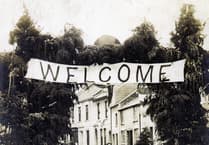TWENTY-five years ago I joined my fellow “Spotlight” presenter Teresa Driscoll and weatherman Craig Rich for a special programme from St Ives to mark the 175th anniversary of the RNLI.
We interviewed the crew, looked back at the history of the station and ended the programme by joining the crowd around the harbour in a rendition of the RNLI anthem “Home from the Sea”.
Afterwards the BBC’s sound engineer told us our singing was so bad that our microphones were switched off and it was left to the crowd to provide the words to the song instead. How rude!
But apart from the singing, I have fond memories of that programme. It was an honour to spend time with the lifeboat crew and to pay tribute to their bravery and dedication.
This year the RNLI is marking its 200th anniversary and I have been reflecting on how often my job involved reporting on the work of lifeboat crews here in the South West.
Hardly a week went by without a story of a dramatic rescue at sea and in the height of summer it was almost a daily occurrence as holidaymakers frequently underestimated the dangers of our coastline.
Alongside the successful rescues there have been the inevitable tragedies when lives have been lost despite the best efforts of the lifeboat crews.
Those crews put their own lives at risk every time they go out on a shout and nothing demonstrates that more than the Penlee lifeboat disaster back in 1981.
The crew of the Solomon Browne went to the aid of a ship that had gone aground in a violent storm. They battled in horrendous conditions to get the crew off the stricken vessel, but the sea got the better of them and all lives were lost.
The last radio message between the lifeboat and Falmouth coastguards is still one of the most poignant recordings I have ever heard and always brings a tear to my eye.
The bravery shown that night sums up why the RNLI is such an incredible organisation and why so many people do amazing things to raise money to keep it going.
I still find it hard to believe that it’s all funded through donations and that the people who launch into the unknown in the middle of the night are volunteers.
If you have watched the recent BBC series “Saving Lives At Sea”, you will know just how highly skilled those crews are.
The programme shows real life rescues as they unfold and often features lifeboats in action off the coast of Devon and Cornwall. Not only is it a reminder of the dangers that the crews face, but also the fact that they all have other jobs.
When you see the level of professionalism demonstrated by the crews it is hard to believe that it’s not their full-time job. Somehow, alongside their regular jobs, they find the time to train to the highest standards so that when that pager goes off they’re ready for anything.
When I say: “ready for anything” I really mean it as well. In a recent episode the crew of the Plymouth lifeboat went to the aid of three fishermen whose boat had broken down and was in danger of hitting the rocks.
When the lifeboat crew arrived they found one of the fishermen was suffering a diabetic incident, another was suffering severe seasickness and the third was struggling to help his friends because he was an amputee!
In the same episode crews further along the south coast were shown going to the aid of migrants who were in a small boat trying to cross the Channel to get to Britain.
This has become a controversial issue and some people have criticised the RNLI for seeming to aid the arrival of migrants into this country. But as the crews pointed out during the programme, they are simply saving fellow humans.
They are not making a judgement on UK border policy or making a judgement about the people trying to get here, they are simply saving lives and as far as I am concerned that is more important than politics.
Lifeboat crews not only have to be exceptional seafarers, they also have to be first-aiders, they need to have compassion and empathy and be diplomats, rising above the controversy created by migrants in small boats.
I am in awe of the men and women who volunteer for the RNLI and it has been a privilege to meet so many of them during my time at the BBC.
They are among those amazing individuals such as the police, fire fighters and members of the Armed Services, who put the lives of others before their own. There is no greater act of selflessness, yet the RNLI crews I have met are very humble.
A few years’ ago I spent a very entertaining afternoon with the crew of the Sennen lifeboat when we broadcast “Spotlight” from the West Cornwall village.
We spent the whole week on location there looking at all aspects of marine life around the South West coast, but the highlight for me was joining the Sennen lifeboat on a training exercise.
I cannot begin to describe the exhilaration as we launched down the steep slipway and plunged into the waves before speeding off around the Longships Lighthouse.
One of the most unassuming heroes of the RNLI in the South West was Matt Lethbridge who was a long-serving coxswain of the St Mary’s lifeboat in the Isles of Scilly.
I often used to see Matt during my frequent visits to Scilly. He was an accomplished artist as well as a lifeboat man and would often be sitting outside his house painting.
He was such a quiet and gentle man that it was hard to believe he took on the ferocious power of the sea to save numerous lives. Heroes come in all shapes and sizes.
But as well as the men and women who go to sea for the RNLI, let’s not forget the back up teams on dry land and all the fund-raisers. Without them there would be no boats or stations.
Thank you one and all and may I wish the RNLI a happy 200th anniversary, but I promise I won’t try singing “Home from the Sea” again.
Bye for now!





Comments
This article has no comments yet. Be the first to leave a comment.